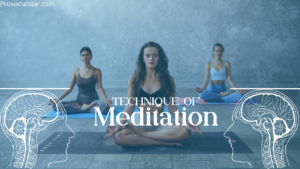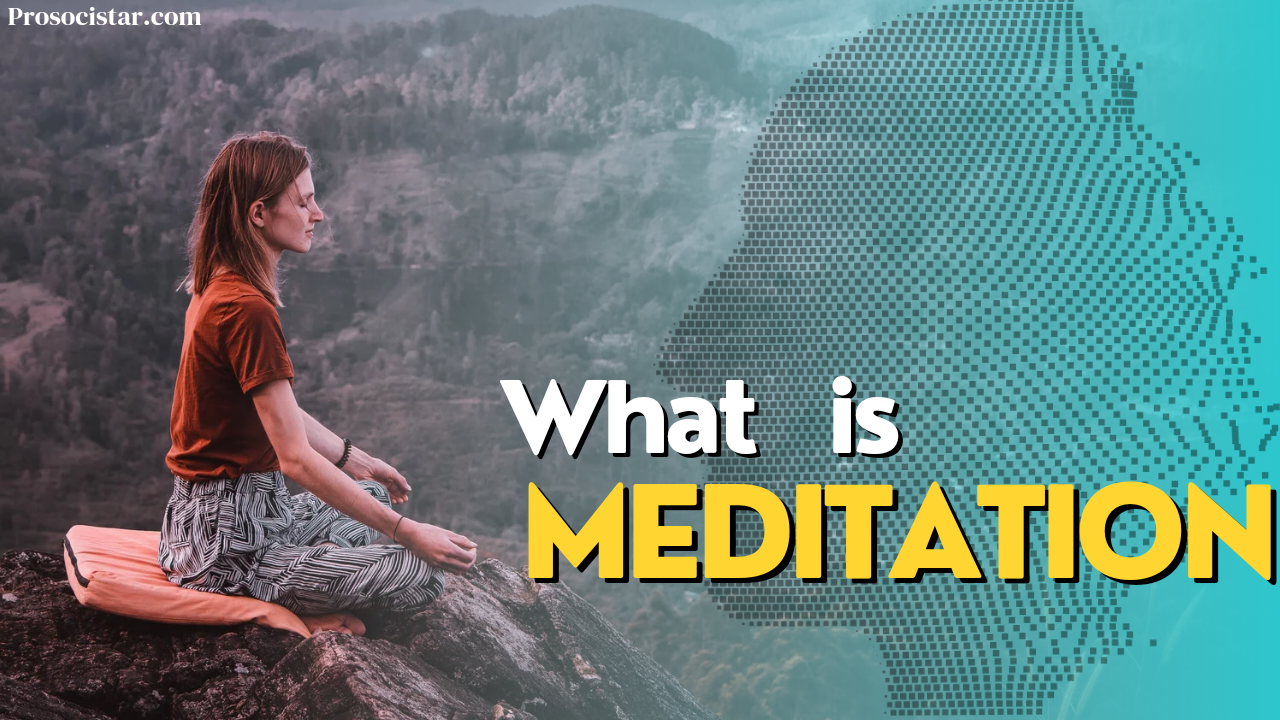
Introduction:
It is a simple yet powerful tool that can help you reduce stress, improve focus, and enhance overall well-being. In this blog post, we will explore what meditation is, how it works, and the surprising benefits of meditation backed by science.
What is Meditation?
Meditation is a hone that involves focusing your mind and bringing awareness to the present moment. It is a way to train your mind to be more present and focused and to develop a greater sense of inner peace and calm. Meditation can be practiced in many different ways, including sitting, walking, or lying down, and with or without music or guided meditation recordings.
How Does Meditation Work?
Meditation works by training your mind to focus on the present moment, rather than getting caught up in thoughts about the past or future. When you meditate, you may focus on your breath, a mantra, or a visualization. This helps to quiet the mind and bring a sense of calm and relaxation. Over time, regular meditation practice can help to rewire the brain, leading to improvements in mental and physical health.
Surprising Benefits of Meditation Backed by Science:
Reduces Stress:
One of the most well-known benefits of meditation is its capacity to reduce stress. Studies have shown that regular meditation practice can lead to a decrease in cortisol levels, the hormone responsible for stress. This can help to reduce the symptoms of stress-related conditions such as anxiety, depression, and insomnia.
Improves Focus and Concentration:
Meditation can also help to improve focus and concentration in your life. A study published in the journal Psychological Science found that participants who meditated regularly for eight weeks had better attention and working memory than those who did not meditate.
Enhances Emotional Well-being:
Meditation has been shown to enhance emotional well-being by increasing positive emotions and decreasing negative ones. A study published in the Journal of Happiness Studies found that participants who meditated regularly for eight weeks reported increased feelings of happiness and well-being.
Improves Physical Health:
Regular meditation practice has been shown to improve physical health in a variety of ways. For example, a study published in the journal Circulation found that participants who meditated regularly had lower blood pressure than those who did not meditate. Meditation has also been shown to improve immune function, reduce chronic pain, and improve sleep quality.
Increases Self-awareness:
Meditation can also help to increase self-awareness. By focusing on the present moment, meditation can help you to become more aware of your thoughts, feelings, and behaviors. This increased self-awareness can lead to greater insight and understanding of yourself, and can help you to make positive changes in your life.
Enhances Creativity:
Meditation has also been shown to enhance creativity. A study published in the journal Mindfulness found that participants who meditated regularly for four weeks had improved creativity and problem-solving skills.
Increases Compassion and Empathy:
Meditation has appeared to improve compassion and empathy. A study published in the journal Psychological Science found that participants who meditated regularly for eight weeks had increased feelings of compassion and empathy towards others.
Improves Cognitive Function:
Meditation has been shown to improve cognitive function. A study published in the journal Frontiers in Psychology found that participants who meditated regularly for four weeks had improved attention, memory, and executive function.

Reduces Inflammation:
Meditation has been shown to reduce inflammation. A study published in the journal Brain, Behavior, and Immunity found that participants who meditated regularly for eight weeks had lower levels of inflammatory markers in their blood.
Improves Quality of Life:
Regular meditation practice has been shown to improve quality of life. A study published in the Journal of the American Medical Association found that participants who meditated regularly for eight weeks reported improved quality of life, including reduced stress, improved sleep, and increased feelings of happiness and well-being.
Conclusion:
Meditation is a simple yet powerful tool that can help you reduce stress, improve focus, and enhance overall well-being. The benefits of meditation are backed by science and include reduced stress, improved focus and concentration, enhanced emotional well-being, improved physical health, increased self-awareness, enhanced creativity, increased compassion and empathy, improved cognitive function, reduced inflammation, and improved quality of life. If you are interested in incorporating meditation into your daily routine, there are many resources available to help you get started, including guided meditation recordings, books, and meditation apps.

what are the different types of meditation?
The different types of meditation include:
Spiritual Meditation: This type is practiced in various spiritual traditions like Buddhism, Taoism, Hinduism, and even in Judeo-Christian traditions. It often involves elements of prayer and supports a deeper connection with the Divine.
Mindfulness Meditation: Based on Buddhist teachings, this popular technique focuses on experiencing thoughts and emotions without judgment, enhancing self-awareness and awareness of the present moment.
Movement Meditation: This practice involves incorporating movement into meditation, making it accessible for beginners, and can be done through activities like yoga, walking, or even daily tasks like cooking or folding laundry.
Focused Meditation: Also known as concentration meditation, this technique involves focusing on a specific object or activity, such as a flame, mantra, or body sensations, to enhance concentration and mental clarity.
Chanting Meditation: Common in various spiritual paths, chanting meditation involves focusing on repetitive sounds or words to clear the mind and cultivate a peaceful state, often accompanied by contemplation of meaning.
Heart-Centered Meditation: This practice focuses on emotions rather than the mind, aiming to cultivate feelings of love, compassion, and empathy by directing attention to the heart and releasing negative emotions.
These types of meditation offer diverse approaches to achieving mental clarity, emotional well-being, and overall mindfulness.
what are a few common mistakes to avoid when meditating?
Common mistakes to avoid when meditating include:
Expecting perfection: Meditation is a practice, not a performance. It’s normal for thoughts to arise during meditation, and the goal is not to eliminate them but to observe them without judgment.
Worrying about immediate results: Meditation is a long-term practice, and benefits may take time to manifest. It’s important to approach meditation with patience and consistency.
Getting upset if you fail to calm your mind: Meditation is not about achieving a completely calm mind, but rather about developing a greater awareness of your thoughts and emotions. It’s okay if your mind is active during meditation; the key is to observe your thoughts without getting caught up in them.
Practicing at any time of the day: While meditation can be practiced at any time, it’s important to find a consistent time and place that works for you. Establishing a regular routine can help deepen your practice.
Trying to control thoughts during meditation: Instead of trying to control your thoughts, try observing them with a non-judgmental attitude. This can help you develop a greater sense of self-awareness and inner peace.
Not doing enough preparation: Before starting your meditation practice, take some time to calm your body and breath, find a comfortable position, and create a peaceful environment. This can help you get the most out of your practice.
Practicing in a noisy environment: While some people may find it helpful to meditate to background noise, beginners may find it helpful to practice in a quiet environment to minimize distractions.
Expecting too much too soon: Meditation is a long-term practice, and benefits may take time to manifest. It’s important to approach meditation with patience and consistency.
Judging yourself: It’s important to be kind and compassionate towards yourself during meditation. If you notice yourself getting caught up in self-criticism or judgment, try gently redirecting your attention back to your breath or chosen point of focus.
Being inconsistent: Consistency is key in meditation. Try to establish a regular practice, even if it’s just for a few minutes a day

How to select the right meditation technique for your needs?
To choose the right meditation technique for your needs, consider the following steps based on the information from the provided sources:
Be Open to Experimentation: It’s important not to get overwhelmed during the selection process and to be open to trying out different techniques until you find one that resonates with you.
Choose Based on Interest: Select a meditation technique that immediately interests you. This curiosity can help you stay engaged and motivated, especially when facing initial challenges.
Avoid Jumping Between Practices: While it’s good to experiment, avoid constantly switching between techniques just because you don’t immediately feel the effects. Meditation is most beneficial when practiced consistently over the long term.
Consider Your Lifestyle and Preferences: Reflect on your lifestyle, preferences, and current mental, physical, and spiritual state to determine which meditation technique aligns best with your needs and supports where you are in life.
Experiment with Different Techniques: Try out various meditation styles, such as guided, unguided, calming, or insight meditation, to see which one resonates with you the most. Each technique offers unique benefits, so exploring different options can help you find the right fit.
Seek Guidance if Needed: If you’re unsure about which technique to choose, consider seeking guidance from experienced teachers or using resources like meditation apps that offer guided meditations to help you get started.
By following these steps and being patient with the process, you can find a meditation technique that suits your needs, preferences, and lifestyle, ultimately enhancing your meditation practice and overall well-being.
what are some resources to learn more about different meditation techniques?
Some resources to learn more about different meditation techniques include:
Mindworks Blog: Offers detailed information on various meditation techniques like Spiritual Meditation, Mindfulness Meditation, Movement Meditation, Focused Meditation, Visualization, and Chanting Meditation.
Headspace Website: Provides insights into 16 types of meditation, including calming and insight meditation, guided vs. unguided meditation, and tips on integrating meditation qualities into daily life.
Relax The Back Blog: Discusses 5 types of meditation, guiding readers on choosing the right meditation technique based on personal preferences and needs, such as guided vs. unguided meditations and calming vs. insight meditations.
Muse Headband Blog: Offers an ultimate list of free meditation resources, including podcasts like Untangle and Tara Brach, the Mindfulness Meditation Podcast, Meditation at the Hammer, Daily Meditation Podcast, and various blogs like Muse, Life and Dare, and Karan Bajaj, providing insights, guidance, and tips on meditation techniques5.
These resources provide a wealth of information, guidance, and practical tips to help individuals explore and understand different meditation techniques to enhance their practice and overall well-being.
What are some free online courses to learn meditation techniques?
Some free online courses to learn meditation techniques include:
Alison’s Meditation Free Online Course: Offers a comprehensive overview of meditation, covering basic principles, types of meditation, and the physical, emotional, and mental benefits it provides.
Mindworks Meditation Online Classes: Provides a free Level 1 Course as the first step in their online meditation training program, allowing individuals to explore meditation techniques at their own pace and convenience.
Udemy’s Free Meditation Course with Sankalpa: Offers a free tutorial on learning three simple meditation techniques, providing beginners with a practical introduction to meditation practices.
Class Central’s Meditation Courses and Certifications: Features various free online courses from reputable institutions like Princeton, University of Virginia, Rice University, and Peking University, allowing learners to earn certificates while exploring different meditation techniques.
Udemy’s Top Free Meditation Courses & Tutorials: Provides a platform where individuals can enroll in in-depth meditation courses from top-rated instructors, including offerings like Meditation Masterclass and meditation teacher certification courses.
These free online courses offer valuable resources for individuals looking to learn and explore different meditation techniques to enhance their well-being and personal growth.
What are the benefits of taking a paid meditation course on class central
Benefits of Taking a Paid Meditation Course on Class Central:
Comprehensive Learning: Paid meditation courses on Class Central offer a more comprehensive learning experience, often covering a wide range of topics and techniques in-depth.
Expert Instruction: These courses are led by experienced meditation teachers and experts, ensuring high-quality instruction and guidance.
Ongoing Support: Paid courses often provide ongoing support, such as access to discussion forums, Q&A sessions, and personalized feedback, which can be valuable for deepening your practice.
Certification: Many paid courses offer certificates upon completion, which can be used to demonstrate your knowledge and commitment to meditation practice.
Access to Premium Content: Some platforms, like Class Central, offer premium content for paid subscribers, providing access to additional resources and materials.
Flexibility: Paid courses offer flexibility in scheduling and pacing, allowing you to learn at your own pace and on your own schedule.
Community: Paid courses often provide opportunities to connect with fellow meditators from around the world, fostering a sense of community and support.
Credibility: Paid courses from reputable institutions, like Princeton, University of Virginia, Rice University, and Peking University, carry a higher level of credibility and recognition.
Personalized Guidance: Paid courses may offer personalized guidance, helping you to tailor your meditation practice to your unique needs and goals.
Motivation: The investment in a paid course can provide additional motivation to commit to and deepen your meditation practice.
FAQs
What is meditation, and how does it work?
Meditation is a practice that includes focusing your mind and bringing mindfulness to the present moment. It works by training your mind to focus on the present moment, quieting the mind, and bringing a sense of calm and relaxation.
What are the benefits of meditation backed by science?
The benefits of meditation backed by science include stress reduction, improved focus and concentration, enhanced emotional well-being, improved physical health, increased self-awareness, enhanced creativity, increased compassion and empathy, improved cognitive function, reduced inflammation, and improved quality of life.
How can meditation help with stress reduction?
Meditation can help reduce stress by lowering cortisol levels, the hormone responsible for stress. Regular practice can lead to decreased symptoms of stress-related conditions like anxiety, depression, and insomnia.
Can meditation improve focus and concentration?
Yes, meditation has been shown to improve focus and concentration. Regular practice can enhance attention and working memory, leading to better cognitive performance.
How does meditation enhance emotional well-being?
Meditation can enhance emotional well-being by increasing positive emotions and decreasing negative ones. It can lead to increased feelings of happiness, well-being, and emotional stability.
Is meditation beneficial for physical health?
Yes, meditation has been shown to improve physical health by lowering blood pressure, boosting immune function, reducing chronic pain, and improving sleep quality.
Can meditation increase self-awareness?
Yes, meditation can increase self-awareness by helping individuals become more aware of their thoughts, feelings, and behaviors. This heightened self-awareness can lead to greater insight and personal growth.
How does meditation enhance creativity?
Meditation has been shown to enhance creativity by improving problem-solving skills and fostering a creative mindset. Regular practice can stimulate innovative thinking and enhance creative expression.
Does meditation promote compassion and empathy?
Yes, meditation has been shown to increase feelings of compassion and empathy towards others. Regular practice can cultivate a sense of connection and understanding towards fellow beings.
How can meditation improve cognitive function?
Meditation can improve cognitive function by enhancing attention, memory, and executive function. Regular practice can sharpen mental abilities and cognitive performance.
These FAQs provide detailed information on the benefits of meditation and how it can positively impact various aspects of mental, emotional, and physical well-being.

1 thought on “What is Meditation? 2.Surprising Benefits of Meditation Backed by Science”